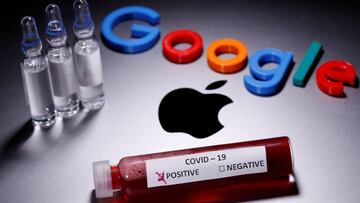How Apple and Google track the coronavirus using your mobile
The two companies have decided to join efforts in order to fight the coronavirus pandemic that is killing thousands of people around the world.

Apple and Google are teaming up during this coronavirus pandemic and they announced a Bluetooth-based Covid-19 contact tracing platform that could alert people if they have been exposed to the virus.
When two people are near each other, their phones can exchange an anonymous identification key, recording that they’ve had close contact. If one person is later diagnosed with COVID-19, they can share that information through an app. The system will notify other users they’ve been close to, so those people can self-quarantine if necessary. Ideally, this means you won’t have to reveal your name, location, or other personal data.
Google, Apple to launch the APP in mid-may
Apple and Google are launching the program in two phases, starting with an application programming interface (API) in mid-May. This API will make sure iOS and Android apps can trace users regardless of which operating system they’re using. But it will be restricted to official apps released by public health authorities on the iOS App Store and Google Play Store.
Following the API, Google and Apple want to add contact tracing as a core iOS and Android feature. The method is a little vague for now, but the goal is that you’d opt in through something like your phone settings. This would turn on the digital key-swapping without requiring a third-party app. Then, if you’re exposed, your phone would signal this somehow and urge you to download an app for more information.
What happens when you have Covid-19?
If you test positive for COVID-19, the system is supposed to upload your last 14 days of anonymous “keys” to a server. Other people’s phones will automatically download the key lists, and if they have a matching key in their history, they’ll get an exposure notification.
What happens when you’re exposed?
Related stories
If people share their data as described above, your phone will check the list once a day and look for key matches, then notify you if it finds one. Google’s sample alert is pretty simple: it just reads, “You have recently been exposed to someone who has tested positive for COVID-19,” and offers a link with more information. That information will be provided by whichever health authority is offering the app, and we don’t know what it might include — although at the very least, it will probably explain COVID-19 symptoms and self-quarantine guidelines.
Live coverage of the coronavirus crisis
You can keep up-to-date with the latest developments in the coronavirus pandemic by following our daily live blog.

